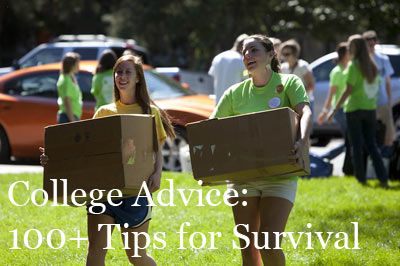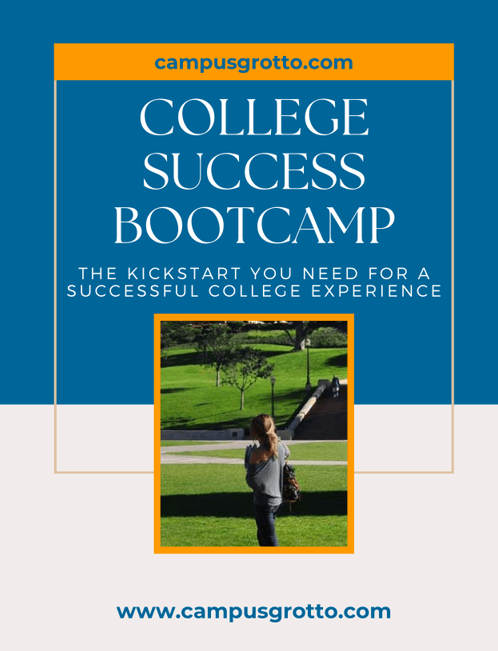
College is no cakewalk. It takes a lot of hard work and dedication to get that degree and maintain a respectable grade point average.
Let's not mention that you'll also be balancing that with all the social aspects and other distractions that are present on a college campus.
Yes, the path to graduation may be a rough and rugged road, but with the right attitude you can survive the ride.
In an effort to provide some of the most helpful advice for college students, we surveyed over 800 former, current and prospective college students to compile this list of 100+ tips of college advice.
Follow these tips to help you on your journey.
More about College Advice Survey
We personally surveyed 406 College Graduates in a long-form questionnaire asking them questions about their college experience, what they learned from it, and what sound advice they could pass along to fellow students. These were former college students who had been through it already, who could provide top-notch college advice for freshmen, underclassmen, and high school seniors.
This college advice survey collected responses from a college graduate questionnaire that included questions such as:
- What advice would you give future students?
- What are some things you liked about college? What are some things you disliked?
- What advice would you give college students on how to save money in college?
The survey also tapped the minds of current college students with 208 college student questionnaires asking students specifically:
- How would you review your college? What are some things you like? What are some things you don't like?
- What advice would you give to future students who are considering applying to the college you attend?
- What advice would you give fellow students on how to save money as a college student?
- What is your biggest complaint about college?
We also thought it would be interesting to note what exact questions prospective college students had and what they were having the most trouble with when it came to college. This way we could understand how we could help ensure their path to college went as smoothly as possible and so we knew where we could provide the most help when it came to offering college advice.
The future college student questionnaire was completed by 254 prospective college students and included questions such as:
- What questions do you have about college or applying to college?
- What articles or tools would you like to see on CampusGrotto.com to help you in your college quest?
- What's keeping you, or might keep you from going to college?
- What classes would you most be interested in taking in college?
- If you were presently searching for colleges to attend, what are some things you would look for in a college to narrow down your selection?
After collecting responses from past, current and future college students, we took the most helpful advice and have compiled it into this List of 100+ Tips for College Students.
Study Tips
- Take advantage of office hours. They are there for a reason. It's your chance to get one-on-one help from a highly qualified teacher. If you are struggling in class, there is no reason why you shouldn't be going to your teacher's office hours.
- Don't fall behind. Don't procrastinate. College school work is very fast-paced and it's very difficult to catch back up.
- Use a study group rather than a late-night cram session.
- Make sure you find yourself a nice study environment. Dorm rooms are not an ideal place to clearly focus on your studies.
- If things get loud, use ear plugs.
- Learn the material the very first time it’s presented rather than having to cram every time there is a test.
- Finals week will be hell, make sure you are prepared.
- The best test preparation is a good night of sleep and a good breakfast.
- Stay organized and manage your time efficiently.
- Keep good class notes. Use note taking tools if you need to.
- Actually read the textbook. You bought and paid for it, so read it. This is usually the material that is on the exams.
- Don't cheat on your exams. This is a very serious offense in college.
- Have a good laptop. It's pretty much a necessity in college nowadays.
- Set clear goals for each class.
- Keep a to-do list of assignments and other projects.
- Prepare for college-level work. The amount of writing and reading required can be overbearing.
- Sit towards the front of the class. It will improve your grade, encourage interaction and your standing/recognition with the professor.
- Ask questions in class or provide input in ongoing class lectures.
- Use the library. It's full of useful resources.
- Don't cite Wikipedia in your research papers.
- Student Discounts - Shop at stores and restaurants that give a student discount with student ID.
- Shop around for textbooks. Buy used or from cheap textbook websites.
- Consider renting textbooks or buying in digital form to save money.
- Check the library for your required books. You may get lucky!
- Ride the bus. Some buses let you ride for free as a student.
- Sell back your textbooks.
- Apply for financial aid early.
- Take advantage of things that are already paid for, such as on-campus meals and library services.
- Use school resources: colleges have video equipment, computers, movies and books for your use.
- Don't use a credit card unless you know what you're getting yourself into.
- Don't be afraid to take out student loans. If you work hard in college you will be able to pay them back.
- Learn to survive on a college budget by penny pinching.
- Don't drive. You'll have pretty much everything you need within walking distance.
- If you're an overachiever, take the maximum allowed credits per quarter and get most out of your tuition.
- Take advantage of free stuff as a college student.
- Apply for college scholarships. Many scholarships are fairly easy to obtain and only require a written essay.
- File your FAFSA on time.
- Make a real effort to get to know more people. This is a new beginning for everybody and a great place to make new friends. Be outgoing and ready and willing to meet new people. These people are in the same boat as you.
- Spend your first year of college in a dorm/residence hall. While it may be crowded, it's a great place to easily make new friends.
- Get involved on campus and join organizations that interest you. Another great way to meet people and give you student leadership experience.
- Befriend upperclassmen. They're pretty good at giving advice and getting you into good parties.
- Make friends with your RA. It might keep you out of trouble.
- Be able to handle alcohol and know your limits (if you do decide to drink).
- Thursday is the new Friday.
- Maintain. For many college students, it's their first time away from parents. This formula can lead to some wild times.
- Don’t give in to peer pressure. Whatever you may think, you are not in college to drink and party.
- Learn how to say NO. When it comes to drugs, partying on a study night, etc. Have the courage to tell your friends no.
- Try and get along with your roommate. You don't want any awkwardness between you two.
- If you don't like your roommate, get a new one.
- Expect to deal with all kinds of people. There is a greater diversity of people in college than there was in high school.
- Your friends will change a lot over the next four years. Let them.
- Make your housing plan for next year well in advance so you have plenty of time to look if you choose to live off-campus.
- Don't wear pajamas to class.
- Balance school, work, and a social life – A schedule that doesn't leave time for sleep.
- Go to college football games. Even if you don't like football, you'll have fun.
- Join an intramural team. It's fun, competitive, and another great place to meet new people.
- Unless you two are really serious, lose the long distance relationship.
- Keep in touch with parents. They'll miss you and can comfort you in this time of change.
- Rush the fraternities/sororities. It's not for everybody, but at least check it out.
- If you decide to go Greek, don’t pledge during your first semester. Most students find that their GPAs go down during the semester they pledge, so if you do, take an easier load of classes.
- Make friends with students, professors, and other influential offices on campus. It can really help you when networking later.
- Use facebook, just not all the time.
- Be careful to what you post publicly on social media websites.
- Before selecting your major, consider taking a few related classes or even doing an early internship to make sure it's actually something you want to do.
- If you can't decide on a major, take classes that will interest you.
- Take a wide variety of classes your first two years, that's your experimental phase. Take the courses that interest you and some that don't. Give your mind and soul opportunities to be bent in directions you would not ordinarily choose. You may just find something you love that you didn't even know existed or that you thought you hated.
- Select classes carefully - Read the syllabus, check out the teacher, and maybe even sit in on a class session or two to see if it's fit for your liking.
- Check out prospective teachers through online professor rating services.
- Don't schedule early morning classes if you're not a morning person. It becomes very tempting to skip that 8am class in the lecture hall.
- Take a few classes on subjects that you enjoy!
- Register for your classes as soon as possible, because classes fill up fast.
- Take a few classes outside your major. It'll open you up to new ideas/people.
- If you don't want to continue on for a master's, make sure you pick a degree where a master's isn't needed to be competitive in the workforce.
- Learn how to cope with stress. College can be very demanding.
- Maintain a healthy diet. Don't be a victim of the freshman 15.
- Learn how to relax and take breaks. Your time at college goes by quickly.
- Take advantage of your school's fitness center. Fight off that freshman 15!
- Wear sunscreen.
- Wear sandals in the showers.
- Wear comfortable shoes. Prepare to do a lot of walking around campus.
- Familiarize yourself with the rules/policies of the university. Every campus has its own set of rules and regulations, and they are usually pretty good at letting you know what they are. Guidelines, restrictions, rules and regulations of all kinds can usually be found in your student handbook.
- Top Ramen - Learn to love it. It's the perfect food for the college student who's strapped for time and cash.
- Be on time for each class. Don't be known as the one who always comes in late.
- College is living in a small cramped room with tons of work, not getting enough sleep, not getting good healthy food, and having to deal with various stresses and negative externalities.
- Learn to love teamwork. It is the new frontier in most college classes.
- Get to know your professors. Getting to know them on a more personal level may increase your standing in class and always helps come grading time.
- Going to class is important. College is expensive, so better get what you pay for.
- If you do buy your textbooks at the bookstore, wait a couple of days into the term to avoid the long lines.
- Wait to buy your books until after you go to class and get the syllabus. The bookstore has a list of the books you will need for each class, but that list is not definitive.
- Sit towards the front of large lecture halls. Sitting in front makes it easier to pay attention and see whatever is on the overhead projector. It is also easier to understand the point the professor is trying to make if you can see him or her. The people who sit in the back tend to fool around more and do worse in the course.
- Take college serious from the start, it's not high school anymore.
- Become familiar with PowerPoint. It's great for class presentations.
- Be open-minded. Self-explanatory.
- Ask yourself, why are you going to college?
- Carry your student ID with you.
- Set goals on what you want to achieve from going to college.
- If you are driving to campus, get there early (before 8am) so you won't have problems trying to find a parking spot.
- Parking is always a problem and you will get parking tickets.
- Practice parallel parking. Prepare for a tough parking situation where you'll have to squeeze into tight spots.
- Take advantage of free help on campus from professors, career counselors, Ombudsman office, etc.
- Go to class!
- Work on your networking skills. It's one of the keys to getting a job after college.
- Take advantage of college internships. Many successful college grads got their foot in the door at the company they work by doing an internship.
- Start looking for a job while you're still in college. So many students graduate without having a clue of what to do.
Student Finance
Social Life/College Life
Selecting Classes/Majors
Health/Personal Safety Tips
General College Advice
Career Tips
Other College Advice Resources
- Tips for Saving Money in College - Results gathered from our survey of college students list some of the tops ways of saving money as a student.
- Student Resources - A list of over 70+ websites useful to college students.
- Best Advice for College Students - A round up of useful advice for students from other sources on the web.
About the Author:

